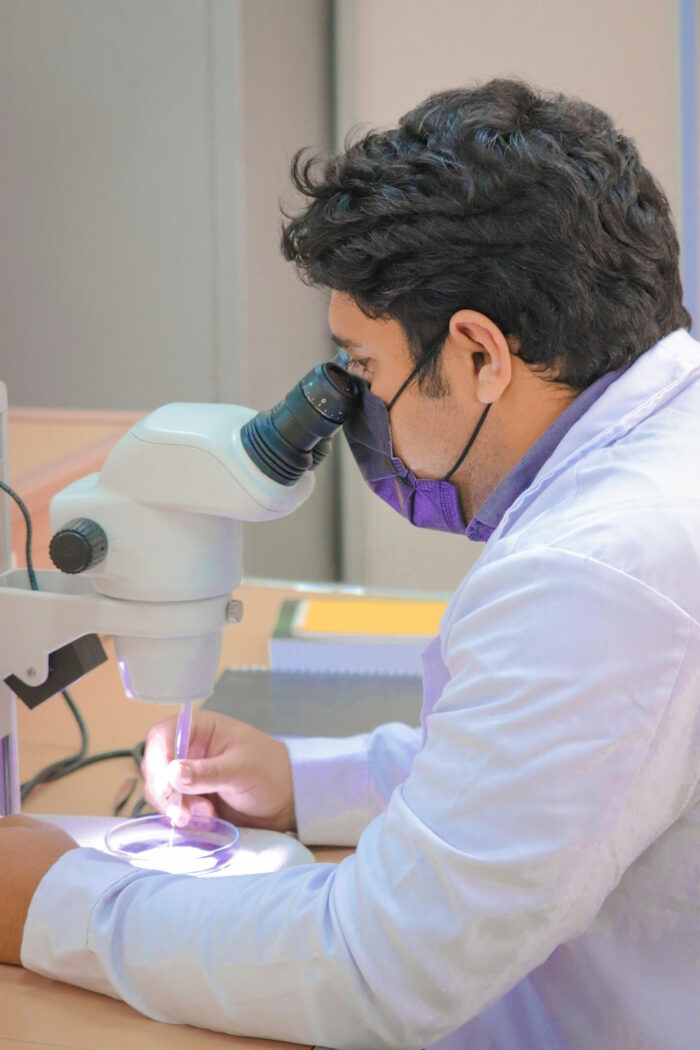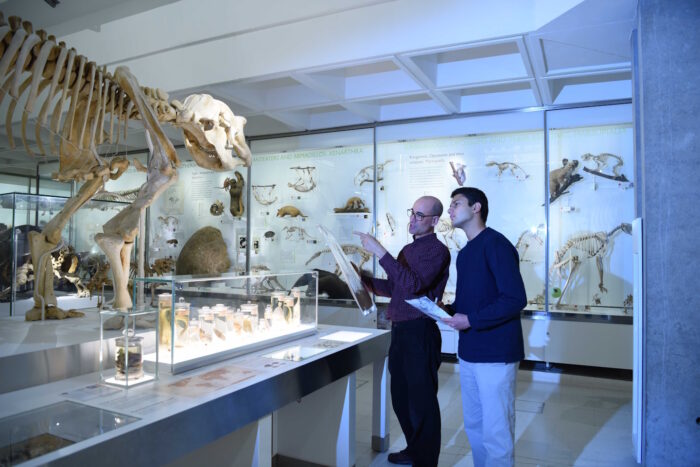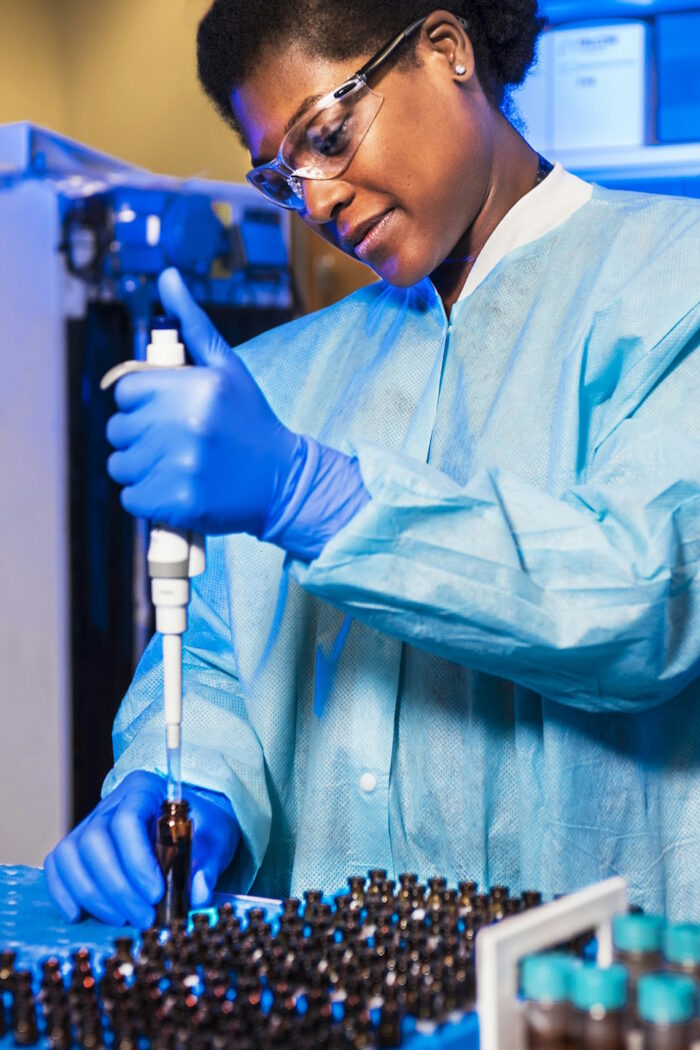Natural Sciences
- UCAS Code: BCF0
- Campus Code: 4
- Duration: 3-4 years
- Places per year: c. 20
Natural Sciences offers a wide range of physical and biological science subjects from multiple departments in a unique and demanding course. A broad first year is combined with increasing specialisation in the second year and the possibility of total specialisation in the third year.
The breadth of the course reflects the blurring of boundaries between the different sciences and before committing yourself to one department you study a variety of subjects, some of which may be new to you. This means you can change your mind about which subject to specialise in.
For an overview of the course content, visit the Natural Sciences course page on the University website. For information about applying for the course at Trinity Hall, continue reading this page!

Natural Sciences
Looking for something specific? Use these quick links to get to where you want to go…
Studying Natural Sciences at Cambridge
Professor Anton Enright, Natural Sciences Director of Studies at Trinity Hall, delves into what the Cambridge Natural Sciences course offers, the differences between Biological Natural Sciences and Physical Natural Sciences, and what sets it apart from programs at other universities.
Anton studied Natural Sciences at Trinity College Dublin, specializing in Genetics, before completing his PhD at the University of Cambridge in 1998, focusing on protein families and biological network analysis. He has since led research on non-coding RNAs at institutions including the Wellcome Trust Sanger Institute, EMBL-European Bioinformatics Institute, and the Department of Pathology, where he now oversees genomics and sequencing facilities.
Entry Requirements
Minimum Offer Level
A-Level: A*A*A
IB Diploma: 42 points, with 776 at Higher Level
Other: See the University’s Entry Requirements page
Subject Requirements
You will need A levels/IB Higher Levels (or the equivalent) in:
- Mathematics
- 2 other science or mathematics subjects
Please note, ‘science/mathematics subjects’ refers to Biology, Chemistry, Physics, Mathematics and Further Mathematics.
For Natural Sciences Physical, we will normally require A* in Further Maths/7 in HL Maths AA.
If you are taking the IB Diploma, we will require HL Mathematics Analysis and Approaches if you wish to apply for Natural Sciences Physical. For Natural Sciences Biological, we recommend Analysis and Approaches but we will also consider Applications and Interpretations.

Admissions Process
Written Work
None required.
Admissions Assessment
All applicants for Natural Sciences are required to take the Engineering and Science Admissions Test (ESAT) at an authorised assessment centre. You must register in advance for this test.
Please see the University’s admissions test page for more information.
Interviews
Two interviews of around 25 minutes each.
When applying for Natural Sciences at Cambridge, you will be asked to indicate whether you wish to apply for Biological or Physical Sciences. This will determine what kind of questions you will be asked at interview. At Trinity Hall, Biological applicants will tend to be asked questions about Biology and Chemistry, while Physical applicants will tend to be asked questions about Maths, Physics and Chemistry.
Each interview will be tailored to the individual and the subjects they have studied at school. However, interviews will cover some new ground as well – we want to see how well you deal with new material and with the application of your background knowledge to new problems.

Natural Sciences at Trinity Hall
Trinity Hall is a fantastic environment in which to study Natural Sciences, having a dynamic team of academics who teach right across the spectrum of this course, whilst themselves carrying out world-leading research. Our students benefit from a close association with this supportive and inspiring team, who collectively put a strong emphasis on guiding our undergraduates’ course choices and enabling them to gain experience of cutting-edge research in their vacations. Many graduates go on to study towards higher degrees or take up research jobs in industry.
We look for students with a broad and passionate interest in science, so suggest that you read widely around the popular science and more accessible academic literature that interests you most.
Video Resource
Going beyond what you learn at school and engaging with super-curricular resources is a great way to develop your knowledge of your subject and demonstrate your passion at interview.
In this video, you can watch the Trinity Hall Natural Sciences Society discussion on how the colonial past of the UK (and Europe in general) has influenced how students and the public learn about the natural sciences.
Directors of Studies
- Dr Suf Amichay (History of Science)
- Prof Gonçalo Bernardes (Chemistry)
- Dr Boris Bolliet (Astrophysics)
- Dr Pawel Dydio (Chemistry)
- Dr Anton Enright (Pathology)
- Prof Florian Hollfelder (Synthetic Biology)
- Prof Edmund Kunji (Mitochondrial Biology)
- Prof Emilie Ringe (Materials Science)
- Dr Michael Sutherland (Physics)
- Prof Alexandra Turchyn (Earth Sciences)
Other Fellows
- Dr Robert Asher (Zoology)
- Dr Nick Bampos (Chemistry)
- Prof Michael Hobson (Astrophysics)
- Dr Lutz Jermutus (Biomedical Science)
- Dr Joshua Lawrence (Bioelectricity)
- Dr Sofia Lovestam (Biochemistry)
- Prof Valeriya Malysheva (Computational Biology)
- Prof Andrew Murray (Physiology)
- Prof Teuta Pilizota (Physics)
